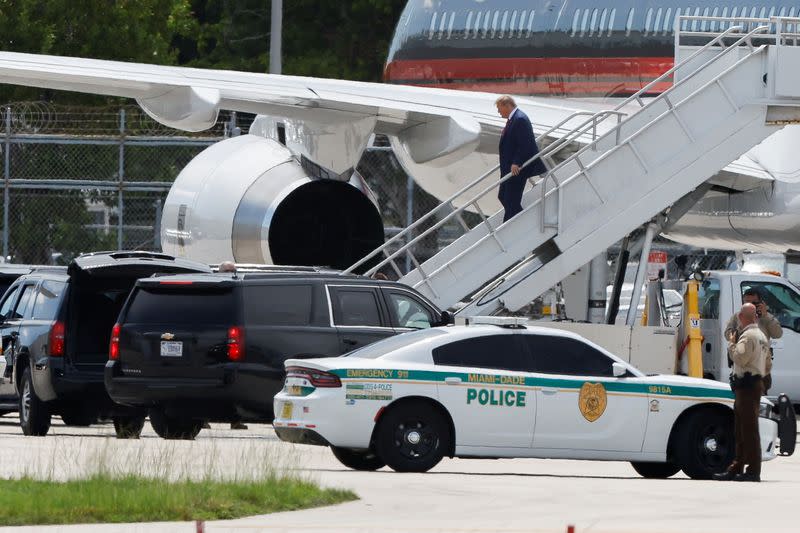'Speedy trial' promised by special counsel in Trump case may not go so fast

- Oops!Something went wrong.Please try again later.
- Oops!Something went wrong.Please try again later.
By Sarah N. Lynch
WASHINGTON (Reuters) - U.S. Special Counsel Jack Smith has said former President Donald Trump will have a "speedy trial" in Miami on a 37-count indictment charging him with willfully retaining classified government records and obstructing justice.
But the complexities of handling highly classified evidence, the degree to which Trump's legal team challenges the government's pre-trial motions, and the way the judge manages the schedule could all lead to a trial that is anything but swift, legal experts say.
“In every case that I had involving classified information, we never had a speedy trial," said Stephanie Siegmann, a former chief of the national security unit of the U.S. Attorney's Office in Boston, who noted that the evidence-sharing process with Trump's defense team known as discovery could potentially take a year.
“This case will be designated complex because it involves classified information," added Siegmann, now a partner with the law firm Hinkley Allen.
The U.S. Constitution guarantees criminal defendants the right to a speedy trial, and defendants in federal cases are allowed to have a trial start as soon as 70 days from the time they are indicted.
But in most criminal cases, both sides can agree to pause that clock in order to give them more time to prepare.
Delays could be troublesome for Trump, who is currently the Republican front-runner for the 2024 presidential election and may not wish to have the trial looming as the elections approach.
At the same time, his lawyers may want to delay the process for legal or political reasons by lodging objections each step of the way - a tactic he has used in the past.
Smith's pledge for a speedy trial makes sense because he doesn't want to interfere with the election process, said defense attorney Mark Zaid. "But that was just wishful thinking. The reality is the Trump team will be controlling much of the timing of the litigation."
A spokesman for Smith's office declined to comment beyond his public statements, while an attorney for Trump did not immediately respond to a request for comment.
Espionage Act cases like Trump's cases are especially complex because some of the key evidence presented during a public trial is classified.
As such, prosecutors need to balance two seemingly competing forces: The need to protect the nation's closely held secrets while still ensuring that Trump is afforded due process by having access to the evidence to help him prepare a defense.
Many other Espionage Act cases have hinged on a few classified records or even just one document, such as in Boston where a National Guardsman stands accused of leaking military secrets.
Trump, by contrast, is facing charges over 31 top secret or secret documents - a far greater number.
After Trump enters his plea, both parties and the court will need to follow a strict and meticulous set of rules set forth in a law known as the Classified Information Procedures Act to protect the classified records and manage how they can be disclosed.
"CIPA has so many different steps, that each one just by virtue of the fact it's a step takes an uncertain amount of time," said attorney Kel McClanahan.
These CIPA procedures will require Trump's defense team to obtain security clearances in order to view classified materials.
Deciding how classified evidence is shared, both to the defense team and to the jury, can get contentious and may lead to legal battles that will play out largely behind the scenes under seal. At times, some of those hearings by law must be conducted ex-parte, meaning Trump's own lawyers cannot be present.
Moreover, in Espionage Act cases, decisions on pre-trial motions related to classified evidence can be appealed - an extra step that is not usually allowed in most routine criminal cases.
If for example prosecutors seek to shield records that reveal battle plans or nuclear weapons secrets, Trump's team could agree it should be protected, or they could fight to make it public.
"Some defense teams would agree that that information has to be protected," said David Aaron, a veteran former Justice Department prosecutor now with Perkins Coie.
"But a defense team has every right to contest the idea of even protecting that at trial...They could go ahead and challenge every single argument the government makes."
(Reporting by Sarah N. Lynch; editing by Amy Stevens and Alistair Bell)

